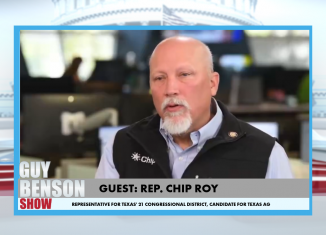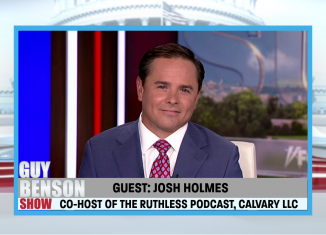Sen. Bill Cassidy (R-LA) On The Impact Coronarvirus Is Having On Children & Students
Senator Bill Cassidy joined the Guy Benson Show to share his perspective on How thew cornoavirus is affecting Chidren. Saying,
“Children are paying the highest price. They’re extremely low risk of having problems of infected with coronavirus virus. But they’re missing out on school. Some kids are missing out on a decent meal. Their parents can’t work because there’s no day care. And the parents need to work in order for the family to do better financially. Kids are paying a price and I’m not sure a lot of thought has been put into how to go forward to get them back in school and that it is not an option to lead them out of school for the next 18 months until there’s a vaccine. That is not an option. So we need a strategy where we get them back into school. The schools open up, but we still keep everybody safe.”
Listen To The Full Interview Below:
Full Transcripts
Guy Benson: A new hour on the guy best in show. Thank you for listening live. I’m coming to you from my house wherever you are likely in your home. We thank you for being here every single day. If you missed the show, if you missed any part of the show, we recommend that you listen live each day. The podcast is free of charge. Guy Benson, showcom i-Tunes Spotify. A panoply of options for you to get the free guy Benson Show podcast. Fox News Alert in this new hour. After a series of tough days on Wall Street, the Dow closing up significantly today, up three hundred and seventy seven points to twenty three thousand six twenty five. So I want to bring that to you. Also want to bring to you our next guest. It is Senator Bill CASSIDY, medical doctor, U.S. senator from Louisiana, and he joins me now. Senator, great to have you back on the program.
Sen. Cassidy: Hey, guy. Thank you for having me, brother.
Guy Benson: I watched a lot of that. Hearing that you were a part of just the other day with Dr. Foushee and some of the other health officials. And I thought that there were a lot of really good questions and fair challenges that were presented by senators from both parties. I thought other senators maybe didn’t do quite as great a job in my estimation, but I was particularly interested to hear some of your thoughts and questions. Given your medical background. So now that you’ve had, what, 48 hours or so to digest everything that you heard over those multiple hours in those hearings, what were some of the big takeaways in your mind from what you heard from Dr. Foushee and some of those other officials
Sen. Cassidy: People have not fully thought through the impact? This is having a point. Children, which, by the way, guide children are paying the highest price. They’re extremely low risk of having problems of infected with coronavirus virus. But they’re missing out on school. Some kids are missing out on a decent meal. Their parents can’t work because there’s no day care. And the parents need to work in order for the family to do better financially. Kids are paying a price and I’m not sure a lot of thought has been put into how to go forward to get them back in school and that it is not an option to lead them out of school for the next 18 months until there’s a vaccine. That is not an option. So we need a strategy where we get them back into school. The schools open up, but we still keep everybody safe.
Guy Benson: OK. So I want to actually drill down on two of those points because my next question was going to be about schools and kids. So we’re already there. I agree with you. I think what you said makes a lot of sense. And I appreciated some of your comments along those lines during the session. And I also heard Senator Paul, who’s also a doctor, echo a number of those points. Here’s my first concern, though, before we get to the strategy to go back to school. I have read and I was doing some Googling and I was reading various news accounts from not just in the U.S. but around the world. In the last few weeks, about. Kits and how they’re affected by Corona virus, we know that almost none of them, like the number total is close to zero, have died, especially under the age of 20 from coronavirus. There is this strange and scary to a subset of a handful of cases that seem to be linked to Cauvin, this Kawasaki disease or something like that. Yes, it was a small number, but I’m really having trouble actually getting a good answer on do kids get this disease is even if they don’t get hammered by it with their own personal health, can they transmit it to adults? Do we? Do you feel confident that we have answers to those questions?
Sen. Cassidy: Guy? My gosh, man, you ought to be on the faculty of a medical school.
Guy Benson: No, thank you.
Sen. Cassidy: Listen, that that is the question before us this morning. I was reading a medical journal, online journal, American Medical Association, the pediatric section. And then I read something else last night out of Iceland. And the people in the pediatrics journal were talking about how kids are paying the price. And then the Icelandic study suggests that children are very low risk of infecting other people because they don’t have symptoms. They’re not coughing and sneezing. So therefore, they’re less likely. Maybe that’s the thought to infect others. So even if a parent, you know, could be at risk, the kid doesn’t give it to him. So and it’s also pass while speaking to someone else that thinks that the viral load, which is how infectivity of your if you’re spewing out a lot of virus, you’re more effective. If you’re not, you’re less infective that children have a lower viral load than do those who are older. So those questions have not been answered. There have to be ask, but we can’t wait on the answers to reopen schools. I we’ve got to have a strategy that works now.
Guy Benson: Now I think I think and we’ll get to the strategy in just a second. I guess my one follow up is because. Yeah, it seems like you and I are in the same boat. You’re much more knowledgeable as an actual talker than I am. I’m just reading stuff and people are saying, yes, we think that maybe kids don’t really get this much at all or they can’t transmit it to adults. Yes, they can. One of the concerns I’ve read is what if they are if they’re separated? Very low risk. Extremely low risk. But if they’re all now put back into schools into one place, then they’re in very close contact with each other. That could increase the rate of transmission internally among kids. Then they go back to their households and there’s parents, there’s grandparents and that sort of thing. What what do you make of of that at least that concern that some people are floating?
Sen. Cassidy: That’s why you need a strategy. You can’t just tell the society, go forth, be strong, don’t worry about it, cause then somebody is going to die. We shouldn’t die or get callous. Ocky disease. They’re good. You gotta have a strategy. And by the way, we speak of locking down a state. You look at one part of Louisiana or say Texas and there’s no infection at all. You’ve got another part. The hospitals are full. So you can’t just take the state of the unit, lock the whole thing down. You’ve got to use your data to say, wait here. We got a problem. We need to lock it down. But over there. Hey, do your farming. Ride your tractor, Burack. So I think we need a strategy. We just can’t have Blanket go back to school or worry about it. No, we’ve got to say go back to school. This is how we’re going to keep you safe.
Guy Benson: And what do you think some of those bullet points, top line bullet points, in your opinion, to at least get that ball rolling? What should school districts in and state officials and local officials be thinking about? Maybe not for May or June, but certainly for August or September.
Sen. Cassidy: Well, ideally, you would have a multilayer way of detecting ideally every person when he comes, the school is going to be screened for virus. And if they’re not you every day they go home for the day of the day, they start. Now, there’s also a way you could screen the whole school every day. Listen to what I’m about to say. Imagine that. And these tests are coming out. You could measure the virus in someone’s saliva. And so you would have everybody come in and everybody would put their saliva in one container. 200 kids, you test that single container of saliva for a virus. If it’s negative, then the whole school’s negative. So if it’s positive, maybe you have grades one through four in one container and grades five through eight in the next. So then if you’re if your overall is positive, then you check the next level and then you keep going down. And after about 10 test for a school of, you know, 200 people, you’ve actually figured out which one is positive. Now, that would be a way to determine. And then, by the way, within the school, everybody’s self contained. When I was a kid, recess read out. Now, five hundred kids ran around the same time. Know your first grade would go out, then your second grade would go out your third grade. So you keep people contained within their units so that if there’s an infection, you don’t have to close the entire school. You’re going to enclose just a portion of the school. And then people are talking about U.V. rights being shown at the ceiling of their circulates, it kills the virus. So in each classroom you have a U.V. light. This has been done. An emergent shoos me in the operating rooms forever. So it’s not anything mysterious. It’s just what we do to kill viruses in the operating room.
Guy Benson: explain. Explain that part, the U.V. light idea.
Sen. Cassidy: So the movie people have talked about, you know, ultraviolet light, which is part of the spectrum that it may cure viruses. And so the idea is that you would just have it, you know, pointing to the ceiling. But within a room, air circulates. So the air circulates. Any virus that might be circulating would be killed by the U.V. light. Now, it’s not yet established that U.V. light, does it? But if it does, that would be a simple, inexpensive modification to do for every classroom. You know, other things you just think through, leave the doors open at all times. You never close them. And that way, people don’t have to hold hand. Don’t have to grab a door handle to open the door. So therefore, one less surface to touch. So you just think it through. Have a strategy. We can do this. By golly, we’re Americans. We’re not going to. You know,.
Guy Benson: What do you think? Last question. We about a minute left. What are the negative implications of having kids? You mentioned a few of them having kids home from school for so long. Those are those are part of the discussion to those worries.
Sen. Cassidy: Oh, yeah. By the way, a kid whose brain is five years old will never be five years old again. It’s not like, you know, at some point your brain has finished maturing at neurons are not being laid down. When you’re five, you’re a sponge. And my gosh, you’re just soaking it in. And if you don’t so good in when you’re five, you can’t make it up when you’re six. Yeah, absolutely. Opportunity cost is huge here. Yeah.
Guy Benson: Well, I think there are there are elements to this that sounded like the simple talking points don’t address. And that’s why I appreciate hearing from what you had to say and some of the other senators at the hearing earlier this week. We look forward, Senator, to having you back as Senator Bill CASSIDY, Republican of Louisiana anti-matter. Thank you, Senator.
Sen. Cassidy: Thank you, Guy
Guy Benson: We will take a quick break. When we come back. I am. I’m amazed by what some of our colleagues at another network are planning on doing. I will explain right after this break. Fresh conservative talk to Guy Benson Show.








